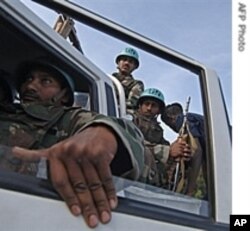Amnesty International says it opposes the DRC government’s call for U.N. forces to withdraw from the country by the middle of next year.
U.N. troops (MONUC) and government forces are currently involved in another joint operation to try to drive out Rwandan Hutu rebel forces in the east of the country. Similar offensives also have been launched in the past against the Ugandan LRA rebels in the country.
The eastern DRC has been marred by conflict for many years resulting in millions of deaths, most of them civilians. The human rights group says, “Massacres, rapes and looting continue in the country unabated."
Andrew Philip, Amnesty International’s researcher on the DRC, says, “Yesterday, it was confirmed publicly and officially that the government has requested MONUC to leave the country by June 2011. -- a withdrawal that should commence, the government has asked, by June of this year,” he says.
Amnesty calls it a “very dangerous move on the part of the government.”
“We don’t think the time is right for a withdrawal, or indeed a substantial reduction of the U.N. peacekeeping force in the Congo,” he says.
Why now?
“The government is anxious because it’s facing elections in 2011. I think it’s anxious to demonstrate to its own population, to the rest of the world that the security situation in the east of the country is improving. I think it’s also nervous of too much international involvement in the DRC around the time of the elections. It has asked MONUC to leave mainly for political reasons,” he says.
However, Philip says the decision has “failed to take into account the real needs of its population or the risks involved.”
Many human rights groups and aid organizations have highlighted the ongoing violence against women in the eastern DRC. Rape, they say, is being used as a weapon of war to demoralize and subdue the population. Some women have been so brutally attacked, that doctors say even surgery cannot repair all the physical damage done.
“Let’s look at some basic facts. MONUC for the moment is mainly concentrated in two provinces in eastern DRC, which are the Kivus (North and South), which have a population of around 8 to 10 million. MONUC is currently the only force that is capable of providing a measure of relative protection to that population,” he says.
The national army
Philip says, “The government army hasn’t proven itself capable of protecting civilians. And indeed itself has been responsible for numerous human rights violations. The real fear is that if MONUC is withdrawn the local population will be at the mercy of armed groups that still continue to operate in that part of the world.”
He also says the national army is not properly trained or equipped and is poorly led “or under direct government control in all cases.”
Is MONUC’s withdrawal mandatory following the government’s decision? Philip says, “This is a difficult area for the U.N. because of course they’re there with the permission and consent of the government. So in a sense their hands are tied a little bit by what the government says to them.”
However, he says the United Nations and the African Union could send a strong message to the government that now is not the time for MONUC to leave.
“It’s also I think incumbent on the government to think very hard and carefully about what it is asking MONUC to do. Many, many preconditions that had been set for the withdrawal of MONUC back in 2007 haven’t been met at all by the government. And it’s something they need to consider very carefully because, frankly, they’re playing fast and loose with the lives of their own people,” he says.
Last December, the U.N. Security Council passed a resolution, which in part, reads: “Stressing the primary responsibility of the Government of the Democratic Republic of the Congo for ensuring security in its territory and protecting its civilians with respect for the rule of law, human rights and international humanitarian law, and stressing the importance of urgently undertaking comprehensive and lasting security sector reform and of permanently disarming, demobilizing, resettling or repatriating, as appropriate, and reintegrating Congolese and foreign armed groups for the long-term stabilization of the Democratic Republic of the Congo.”
Amnesty says MONUC is the largest U.N. peacekeeping mission in the world with over 20,000 personnel. The current authorization for MONUC expires May 31st. The U.N. and the Congolese government are currently meeting on the issue.







